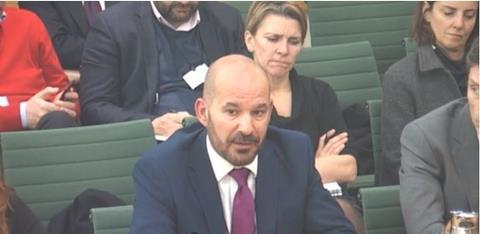Mark Farmer tells select committee that digital and offsite opportunities are there for smaller firms

Modern methods of construction have the potential to offer opportunities to small and medium-sized housebuilders, a group of influential MPs heard yesterday.
Mark Farmer, chief executive of consultancy Cast and author of the 2016 report on industry work practices entitled ‘Modernise Or Die’, told members of the Housing, Communities and Local Government select committee yesterday that large housebuilder such as Berkeley Group were making great strides with MMC but there were also areas which could work well for smaller companies.
“A lot of people think the worlds of MMC and SMEs are mutually exclusive,” Farmer (pictured) said.
“But there are a lot of places where the models can come together, particularly in the supply chain and the worlds of custom or self-build, or smaller builders at a smaller plot level.
“And if there are big industrialised platforms building things in factories there’s a massive distributive supply chain opportunity for assembly teams.”
Builders that may be building traditionally in locations could become part of distributive supply chains for large centralised production platforms who want to use local builders but in assembly roles rather than jobs such as bricklayers, Farmer argued.
“You still need local people. You can license the training. I already see some of the larger manufacturing platforms already doing that by engaging with SMEs. There is an opportunity, but most of it’s a mindset issue if they want to engage.”
Farmer also said work needed to be done to reassure the public that new manufacturing systems were “quality-led, prototyped and researched and developed properly and he hoped a warranty assessment protocol, featuring input from banks, insurers and the industry, would be published later this year.
“We need a common set of quality-led standards that everyone adheres to, otherwise we run the risk of poor MMC entering the UK market and that could set the industry back 20 years,” he added.
He said he understood the concern around materials used in MMC-built homes but argued that if manufactured “in an assured and technology-led way…there can be more certainty of the outcome”, although he acknowledged that insurers might have an aversion in some instances to homes containing some element of combustible material.
“At the end of the day you can’t forced the insurance community to underwrite something it is not prepared to do,” he added.
Farmer also told MPs the current Help to Buy scheme was a missed opportunity to promote MMC and better-quality homes.
“At the moment the Help to Buy policy is being used in a fairly indiscriminate way, some would say a slightly unintelligent way.
“The way housebuilders are accessing Help to Buy doesn’t have any conditionality linked to modernising their delivery models and creating high-quality homes.”
Farmer praised Homes England for recognising MMC as part of its programme of public land disposal, but urged the government to “get more muscular” with driving progress in the industry. “From a policy perspective there are still some important levers that have not been pulled,” he said.











No comments yet